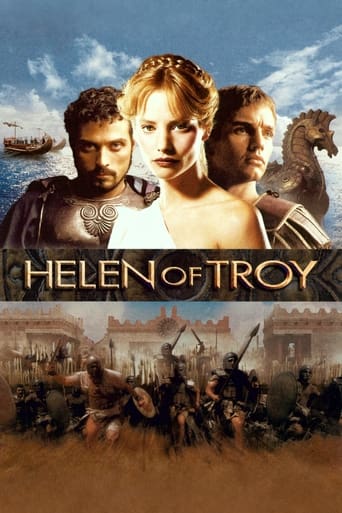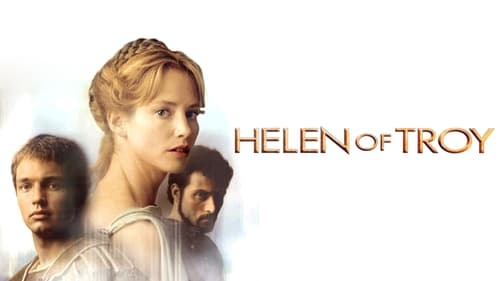Steven Torrey
I liked the movie. It gives a good review of the events that led to the Trojan war. Questions regarding the exact nature of Helen are still debated in scholarly circles. Was she manipulator of people and events, or a victim of events? Did she run off willingly with Paris/Alexander or was she abducted? Was she a flake or was she some sort of über-woman? Sienna Guilory plays to all of these questions. At one moment a waif and when needed--über-woman; at one moment a victim, at another a perpetrator. The role is not as easy to play as one might think.But what if someone like Elizabeth Hurley was cast as Helen? Someone with body size to go with the indomitable and chameleon spirit of Helen? Would there be a different sense to the movie and to Helen as a theatrical role? Complaints about fidelity to the ancient text are duly noted; like reading the Cliff notes, a movie ain't the best way to crib for tomorrow's exam on the Iliad. Helen of Troy. Her story is one that grew over the years and with every accretion changed. In 'Agamemnon', Aeschylus doesn't even want to mention her name, she is a betrayer of Greece. Euripides' "Helen" might be regarded as the first bastardized story-line of the original from the Iliad. The Trojan Horse is an incident from the Odyssey and takes very few lines; Vergil's Aeneid discusses the Trojan Horse in any detail. So to think the viewer is watching an interpretation of Homer's Iliad, better re-read the original.The Greek story can be complicated to follow, especially for the modern viewer. I thought they did an admirable job of getting the general idea--even if some of the details were lost in translation.
Robert J. Maxwell
The story is pretty well known, at least in some sectors of social space, so I'll just make some observations as I watch this longish version through.Briefly: It's about 1200 BC. Paris, a young man of Troy, falls in love with, Helen, the wife of a Greek king and runs off with her to his home. This annoys the Greeks. They launch a thousand ships and wage a ten-year war against the walls of Troy. The Trojan forces include the noble Hector. The Greeks have Achilles and the wily Odysseus. The war is brutal but finally ends, although the in-family tsuris persists through the post-war period.First, half an hour in, I haven't seen anything in the wardrobe or weapons that was disturbing but I'm not a historian. True, some of the armor looks left over from a movie about the Roman Empire, and in battle the swords don't look like Greek choppers but like the Roman gladius, but it doesn't poison the story. What I definitely could not wrap my head around was Achilles -- a muscle-bound, bald-headed street thug who would have fit very well into one of Cinecitta's sword-and-sandal epics starring Steve Reeves from the 1950s or, better yet, into a modern urban action movie. All that's missing are the barbed wire tattoos. There have been complaints that it wanders too far from Homer's original but so far it resembles the original story, at least the translation I read years ago. I doubt anyone know what the ACTUAL original was like. Homer's version was written down hundreds of years after the event. And I understand it was all memorized oral folklore. The iambic pentameter was a mnemonic device. If the orator screwed up the meter he'd know he'd made a mistake, but it's easy to imagine that improvisation to bring back order was a common event. I doubt that Homer hewed to closely to the hundreds-of-year-old original tale, but then there might not have been that much left for Homer to hew to.At least this one has the gods and goddesses mucking around with things, although not much. Paris gets the golden apple for choosing Aphrodite as the most beautiful of three competing contestants, and she backs Paris in the Trojan War. Next time he should be a bit more pragmatic and choose Athena. Even if she had a face like the rear end of an International eighteen wheeler, she knows about war. Nothing here though about Aphrodite back Troy in the war. There are also complaints about Helen not being worth a war because she's not as bewitchingly desirable as she should be, but in my opinion she looks just fine and would do in a pinch. She's spirited, slender and blond, with a piping voice, a la gamin, and looks vaguely French. If you watch it, you'll see what I mean.I have no memory of Paris on his first visit to Troy being pitted in games against the finest Trojan warriors. (He beats Hector in a knife fight in the arena.) Maybe the scenes were added to juice up the story with more action and to turn Paris into more of a hero, or it may be that my brain is turning to tofu, in which case I will leave it for analysis to the American Culinary Institute. I don't recall that Helen was first kidnapped by the agents of one of the Greek kings either. It looks like padding. But the honorable kidnapper is played by Stellan Skarsgaard whose work I've always admired, whether his character is good or evil. The other performers who stand out are John Rhys-Davies as King Pryam, James Callis as the sneaky Agamemnon, and Rufus Sewell as the honest Menelaus.In the end, only the bare bones of the original remain. We hardly see Odysseus. There is no Patroclus. Achilles never has a hissy fit over his girl friend being taken away. But there IS the Trojan Horse, Achilles dragging Hector's body around the walls of Troy, Paris killing Achilles with an arrow to the heel, and Cassandra's prophecies being realized. A revenge incident is tacked on at the end to provide a sense of justice prevailing. The underhanded Agamemnon is murdered in his bath by his jealous wife, Clytemnestra. But that's from a different play altogether. It's like taking a shoe horn and working the Doolittle raid into the climax of the wretched "Pearl Harbor," only there to provide a feeling of justice having been done.I kind of enjoyed it. The production values are high, the use of CGIs is modest and effective, the photography isn't too gloomy or in high contrast or tinted a ghoulish green, and the editing is sane and classical instead of lightning fast and disorienting. It's a sad story but a very human one. The only characters with truly out-sized flaws are Agamemnon and Achilles. All the other characters are shown as admirable in some way, or at least understandable.
Dave from Ottawa
Unlike the epic TROY, which spent much time and money recreating the spectacle of the Trojan War with CGI, the emphasis here is on the political ambitions and prophecies leading up to the start of the siege of Troy. Rufus Sewell as Agamemnon gives a performance (as the man who would conquer Troy) which eerily evokes Oliver Reed at his sinister best, as he makes it clear that the romance of Helen and Paris was merely a convenient excuse for the events that followed, and that the war came out of his own thirst for conquest. Sienna Guillory is attractive as Helen, but her role is rapidly reduced to that of a bystander in the great events that swirled around her. And the film makes clear its logic about this: how could a woman be responsible for a war in a time when even princesses were chattels of the royal houses to be auctioned off in marriage for political gain? As it deals more intimately with its characters and looks more closely at social power structures and gender roles of the period, this film is much more interesting as a human drama than the rather empty spectacle TROY.
Bernadette Velasco
The movie "Helen of Troy" is a combination of action, adventure, drama and romance. It was produced by Ted Kurdyla, along with many other co-producers, and was released last 2003. The movie lasted for approximately 175 minutes and it was viewed last July 25 to August 2, 2005.Its story was based on The Iliad, an epic written by Homer, which mostly portrays the Greek civilizations of Sparta, Mycenae and Thebes, Greek literature and the Hellenic world. The story was about the abduction of Helen and the war between Troy and the Greeks that resulted from it. Menelaus sought for Agamemnon's help, which he then used as a reason to attack Troy not only to get Helen back, but to capture the city and expand his empire as well. In the beginning of the movie, the three goddesses represent wealth, power and beauty which are the main desires of every person. Most of the characters paid the price of death in fighting for one's country, for honor, as well as for these human aspirations. For the sake of wealth and power, Agamemnon declared war with Troy resulting to the deaths of the warriors of both sides and Troy's downfall. Because of the price of glory in battle, Agamemnon sacrificed his own daughter, Iphigenia, in order to continue their attack; Hector fought for his unfortunate brother, resulting to his own death. And due to Achilles' pride and anger, he dragged Hector's body which symbolized dishonor and shame for Troy. For the price of beauty and love, Helen and his mother, Leda, were both raped because of men's lust for their perfection and immortal beauties.As a whole, I would give this movie a rating of 4 out of 5. The Gods did not play much role in the movie when they always play an important role in the Greek literature. Also, Helen played a minor part; and what were emphasized were the characters around her, the actions they took because of her and the consequences that followed. Nonetheless, both the actors and actresses portrayed the roles of their own characters effectively because it made the viewers recognize and understand more the personality of the Homeric heroes. Moreover, the sound effects, directing, cinematography and the scenery used were factors that made the movie look more real and existent.






